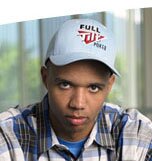Andy Bloch
August 21, 2006
In No-Limit Hold 'em, it can be difficult to know what the right play is on the river when you're out of position with a marginal hand. In my experience, if you think your hand is good enough to call with, you should consider betting the river if you don't think your opponent will try to bluff.
Say you're playing in a tournament and raise in late position with K-10. You know K-10 isn't a great hand, but from late position, it's strong enough to pressure the blinds. The player on the button calls and both blinds fold.
Now the flop comes 10d-7c-3d. This is a nice flop for you and you lead out at the pot. The button calls. What are you to make of the call? Well, he's probably got something – maybe a flush draw or another ten – but it's hard to pinpoint an exact hand.
The turn brings the 2c. This wouldn't appear to have helped your opponent, but you don't really know where you stand and you're trying to avoid playing a big pot at this point in the tournament, so you check. Your opponent bets about half the pot and you call.
The river brings an interesting card: the 4c, making the board, 10d-7c-3d-2c-4c. What's your best play? It's tempting to check again, because of the completed flush draw. But betting here has a few advantages over checking and then having to make a decision if your opponent fires at the pot.
Since the flush cards came backdoor (on the turn and river), your opponent probably doesn't have the flush, and he may doubt that you have it, too. Thus, he will suspect that you're bluffing, having missed the diamond flush draw. So if you bet here, he may call with a hand weaker than yours, like J-10, Q-10, or even 9-9 or A-7. However, there's still the possibility that you have the club flush, so your opponent probably won't raise with a hand like A-10, J-J, or maybe even a set. On the other hand, if you check, your opponent might bet on the river with those hands and you may pay him off, because you think he might be making a thin value bet with a weaker hand like Q-10.
The trick here is to bet a little less than your opponent would have, had you checked to him when he had the best hand. By putting out a somewhat smaller bet, you get to show down your hand cheaply against a better ten or a set, and you will also get your opponent to call with weaker hands that he would have otherwise checked with. Your bet here serves a purpose whether you're ahead or behind in the hand.
If your opponent raises, you can be pretty sure he has you beat and you can fold (unless he's a tricky opponent who may bluff in this spot), having gotten some very good information on the strength of his hand at minimal cost.
Note that this is the kind of bet you want to make when you're pretty sure that your opponent has some sort of hand that you have a decent chance to beat, and that he won't bluff if you check. In spots where your opponent might hold a busted draw and bluff, it's often more profitable to check and then pick off the bluff with a call. For example, you might check and call in this same situation with 10-9 or 9-9 against an opponent who bluffs a lot.
There aren't too many worse hands (if any) that your opponent will call you with if you are beat, and your opponent may check some of the marginal better hands like J-10 or Q-10. The idea in this situation is to lose fewer bets against better hands while you get some value from your opponent's bluffs.
Do that often enough and you're sure to have a good poker career.
Andy Bloch
|



